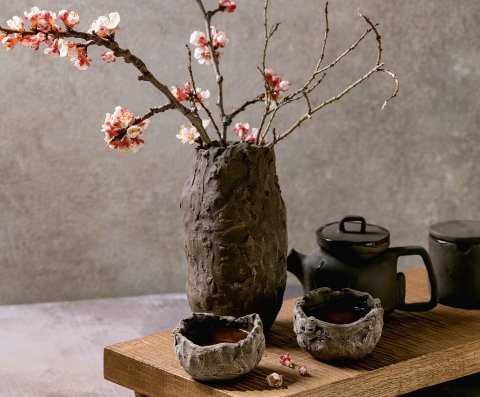With the toll 2020 took on all of us, the pursuit of happiness seemed more challenging than ever, but we learned that everyone can relate to isolation and dark days. How each of us finds happiness is another story though, suggests The Atlas of Happiness: The Global Secrets of How to Be Happy, in which Helen Russell shares 30 countries' take on contentment. Our list below highlights some of our favorite cultural concepts from the book, as well as some additions. From channeling your inner grit—or sisu, used by the Finns to survive the Arctic darkness—to embracing life's fleeting, imperfect moments according to the Japanese concept of wabi-sabi, here are the secrets to being happy around the world.
Sisu
Finland

The Finns uniquely thrive in the long, dark Arctic winter by channeling their inner grit, or sisu, which manifests by embracing their extreme weather—from cycling in snow or even ice swimming. Perhaps soaking in saunas—the national pastime of the "happiest country in the world" three years in a row according to the U.N.—also has something to do with their inner glow.
Friluftsliv
Norway

Friluftsliv technically means "free air life," but its connotation extends to recognize the power of the outdoors to uplift. Norwegians place a lot of value on spending time in nature for spiritual and physical well-being, which may explain why the country ranks so high on the world's happiest places.
Wabi-sabi
Japan

Imperfection, impermanence and incompleteness is the meaning behind the Japanese concept of wabi-sabi. In this traditionally Buddhist country, accepting the transience of life and embracing things in their most natural state leads to contentment. This could be appreciating the beauty in chipped pottery, an aging face or fleeting cherry blossoms.
Azart
Russia

Taking uncomfortable, almost extreme chances is the meaning behind the Russian concept of azart. It invites Russians' zeal for taking life by the horns and surviving anything that comes their way. One time-honored azart practice? Enjoy a hardy birch-twig beating in the sauna at the nearest banya, or bathhouse.
Keyif
Turkey

Taking time every day to savor the simple moments in life is appreciated by Turks. From enjoying meze with friends or strolling along the Bosphorus, keyif—the pursuit of a moment of idle pleasure—is happiness made easy.
Saudade
Brazil

A feeling of melancholy, longing and nostalgia for a happiness that once was or will never happen again, saudade is recognized in the literature and music of Brazil, Portugal and Cape Verde. Portuguese writer Manuel de Melo describes the concept as "a pleasure you suffer, an ailment you enjoy."
Niksen
The Netherlands

Embrace the Dutch concept of niksen—or the art of doing nothing—to dissipate anxiety, allow creativity to bubble to the surface and to boost your productivity. Allow your mind to wander wherever it likes, hopefully arriving at contentment.
Meraki
Greece

The ingredient in all Greek dishes that fill you with joy? Meraki, or simply the labor of love, is the concept that giving your undivided attention to a task, especially a creative or artistic one—like cooking, for example—will bring you and others happiness. So forget multitasking and put some soul into it.
Ubuntu
South Africa

From a word used by the Bantu people across Africa, this humanitarian objective has been claimed by the South African people. During the memorial service for Nelson Mandela, Barack Obama said ubuntu described his greatest gift, "that there is a oneness to humanity; that we achieve ourselves by caring for those around us."













